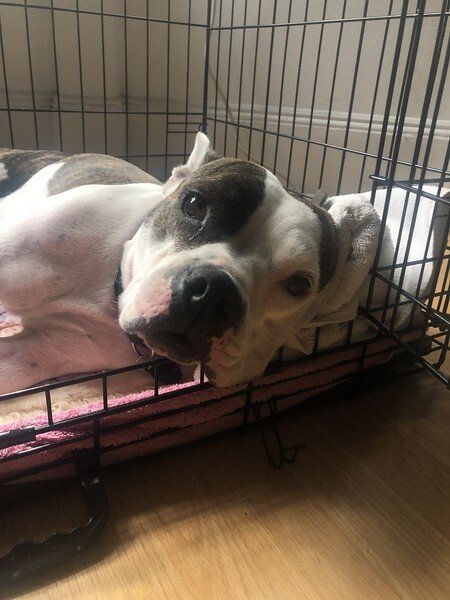The Coughing Canine
Each winter, the number of people suffering from respiratory illnesses like the flu and the common cold skyrockets. This seasonal trend is partially because many viruses survive longer on cold surfaces than warm ones, and partially because cold temperatures suppress our immune system.
The same phenomenon seems to be true in dogs; cold weather brings a wave of respiratory issues ranging from mild congestion to full-blown pneumonia. So as we hope to welcome more dogs than ever in the coming months, we expect to see a lot of coughing and sneezing dogs. As a foster, you are the first to know when an animal becomes ill in our care. Although it’s certainly not your job to diagnose your foster dog, below are some tips that can help you sort out what’s going on when your foster dog gets the sniffles.
Is it even a cough?
Dog coughing sounds different than human coughing. I often hear clients at my clinic describe their dog as having something “stuck” in their throat. They misidentify the cough as the dog trying to “get something up.” Thankfully, true airway obstructions in the throat are rare, and once you hear the huff, huff, HACK pattern, you know you have a true cough on your hands.
Dogs will also develop a similar but much less concerning symptom called reverse sneezing, which is sometimes brought on by excitement, airborne allergies, or eating/drinking too quickly. For those who have never seen a dog reverse sneeze before, it can be frightening, but thankfully this symptom subsides quickly and is very rarely cause for concern.
What is “kennel cough?”
If you search “coughing dog” on Google, you’ll quickly find mention of a condition called kennel cough. Sometimes known by its more formal name Canine Infectious Respiratory Disease Complex (CIRDC), kennel cough is an informal term used to describe this very common condition. There are a handful of causes, some viral, some bacterial. We use the same term because clinically, the symptoms are similar: typically, dogs with CIRDC have a hacking cough, often with no other symptoms. The cough may be non-productive, or may result in the production of phlegm or white foam (tracheal secretions, not to be confused with vomit). Although affected dogs are usually finishing their meals and wagging their tails, the infection can sometimes progress to pneumonia, so careful monitoring is advised.
Many of the causative agents of kennel cough, like Bordetella, influenza, parainfluenza, adenovirus and distemper, are preventable through vaccination, so please be sure to keep your resident dogs up to date on their vaccines while fostering!
What do I do if my foster dog is coughing?
If your foster dog starts coughing, you should contact your foster buddy for further instructions. Include helpful information like whether the dog’s appetite is normal, whether you see any discharge from the eyes or nose, whether the energy seems to be decreased, and whether the cough seems productive or not. This information will help our medical team determine the next best steps. Videos can also be very useful.
Do I need to give antibiotics?
Although kennel cough is often treated with antibiotics like doxycycline, the presence of a cough alone does not mean you should immediately treat with antibiotics. For one thing, kennel cough is not the only reason dogs cough; heartworm disease and tracheal stenosis (aka “collapsing trachea”) are both relatively common. Furthermore, antibiotic use does not come without consequences. Use in young dogs has been linked to higher rates of IBD and allergic skin disease later in life, and antibiotic resistance is a concern at both the individual and global level. Therefore, we typically try to restrict antibiotic use to dogs who have significant discharge (especially yellow/green), are eating less, or seem lethargic. Once you have spoken with your foster buddy, wait for further instructions from the medical team before administering an antibiotic.
Can I do anything else in the meantime to give them relief?
Steam showers are a harmless way to help congested and coughing foster dogs clear their airway. When you run a hot shower, bring the dog into the bathroom with you and shut the door. Give them a soft place to lie down and allow them to breathe the warm steam that emanates from the shower. Just be sure to keep an eye on them (and keep bathroom trash covered or out of reach!).
Happy Holidays to our Muddy Paws Pack!
Dr. Matt Miller has been a volunteer for Muddy Paws since 2020 and works as a veterinarian at Gotham Veterinary Center and Pure Paws. He’ll be celebrating the holidays this year with his wife Hillary, and his pets Sophia, Annie, Dylan, and Eloise.








